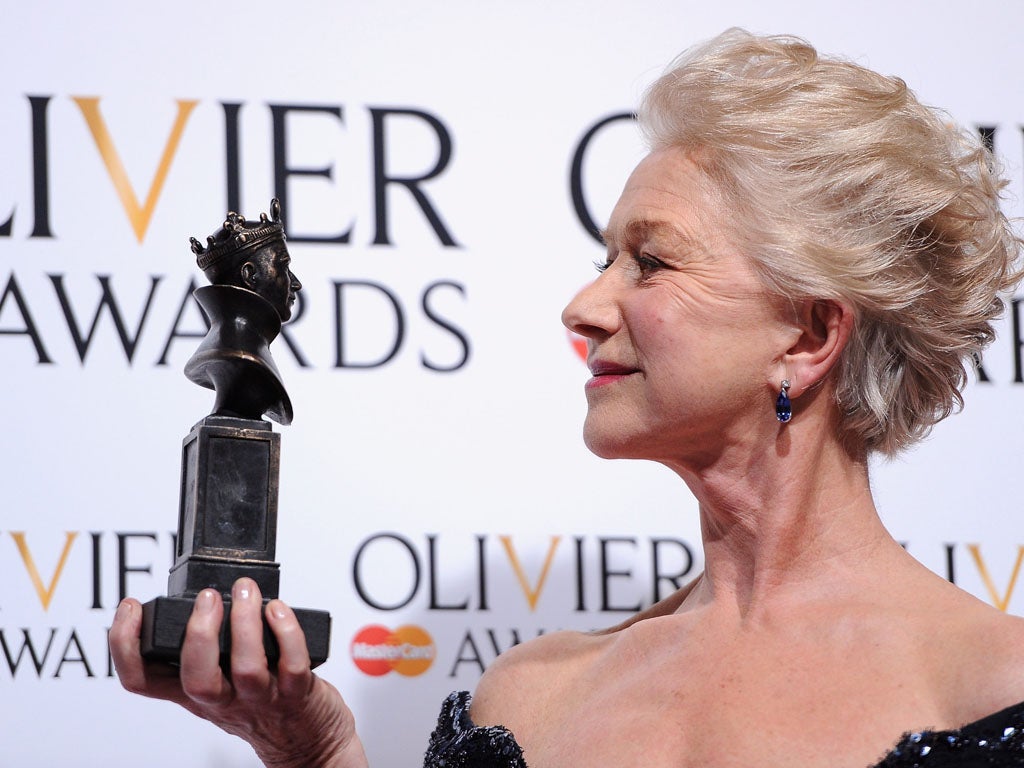Why aren't the Laurence Olivier Awards worth broadcasting?
Theatre may not have the likes of Leonard di Caprio and Sandra Bullock. But the shortlist for the Oliviers isn’t low on glamour


What makes an art form ‘sexy’? I’m at a loss to know. Personally, I find live theatre quite sexy — exciting, arousing, occasionally electrifying. The main TV channels clearly don’t agree as they won’t be broadcasting one of theatre’s showpieces next month, the Laurence Olivier Awards.
In 2013, ITV broadcast a highlights package on its main channel, in the evening of the awards, but didn’t continue doing so subsequently. Until 2003, the Oliviers were filmed and shown after the ceremony on BBC2, and seven years later the BBC picked up coverage again, with Radio 2 broadcasting live from the event. This year that live broadcast will also cease.
Film, of course, is sexy. Only a few weeks ago the BBC broadcast the Baftas, not just the awards themselves, but what felt like hours of the stars arriving on the red carpet at the Royal Opera House. The Oliviers will also be at the Royal Opera House, so there are no concerns about location. It’s just the ‘sexy’ factor.
I remain puzzled. Theatre may not have the likes of Leonard di Caprio and Sandra Bullock. But the shortlist for the Oliviers isn’t low on glamour. The arrivals will include the likes of Jude Law, Hayley Atwell, Katherine Kingsley, and national treasures such as Dames Judi Dench and Edna Everage thrown in.
So why isn’t it worth broadcasting? I can only assume that the BBC believes that young people don’t go to the theatre, and so it lacks that indefinable sex appeal. They are not wholly wrong about the demographic of theatre audiences. But I continue to believe that is nothing to do with the product and everything to do with the price. Theatre quite simply prices itself out of the market, particularly for young people used to cinema prices. The estimable Michael Grandage in his recent West End season showed that one can pack houses with new, young audiences, by offering cheap tickets — £10 in the case of his season of Shakespeare, modern classics and one new play. The National Theatre has also had success with its £12 Travelex tickets seasons.
Producers need to think about the future of the art form as well as their own pockets and entice new audiences in with cheap tickets. At the same time, television, not least the BBC, should be encouraging a love of theatre. A commitment to to do more broadcasts of great performances and some — any — classic drama would be wonderful. Broadcasting the Laurence Olivier Awards, with exerpts from some of the shortlisted productions, from the hilariously irreverent musical The Book of Mormon to Jude Law in Henry V, would have been a good and glamorous way to give TV viewers a taste of some of the great work that has been on during the last year. It’s an opportunity wasted.
Is it the end of a musical era?
Even Christine Keeler and Mandy Rice Davies were insufficiently sexy, it seems, as the Andrew Lloyd Webber musical Stephen Ward about the 1963 Profumo scandal closes tonight, as does From Here to Eternity by Lloyd Webber’s erstwhile sparring partner, Tim Rice. It’s an unhappy coincidence, but do the two early closures really mean the end of a musical era, as many have been saying? I think not. Lloyd Webber will be back for sure. He remains one of the greatest composers of musical theatre in the world. His biggest mistake with this show was the decidedly unsexy title. Tim Rice’s musical was simply not good enough. This still fine lyricist needs to ally himself with a great composer again. Lord Lloyd-Webber might be at a loose end.
The arts are not a premium extra
David Elstein, who has served in extremely senior positions at various TV channels, has been part of a team looking into whether the BBC licence fee should be replaced by subscription. I was struck by an aside that Elstein made in an article on the subject. He advocated a basic subscription service for the BBC and a premium service for such things as sport, movies, documentaries and the arts. Can we please kill this notion that the arts are a premium extra rather than a basic need? To give credit to Sky, it puts its arts channels on its most basic subscription. The arts have to be seen as essential viewing and the most basic part of any television service alongside news and current affairs. It’s depressing that a TV guru could suggest otherwise.
twitter.com/davidlister1

Join our commenting forum
Join thought-provoking conversations, follow other Independent readers and see their replies